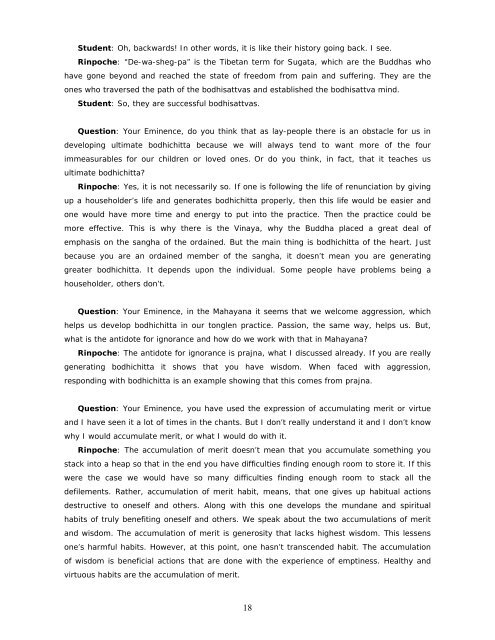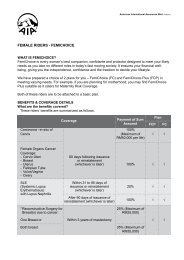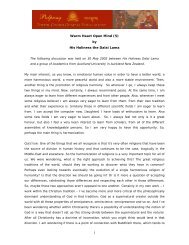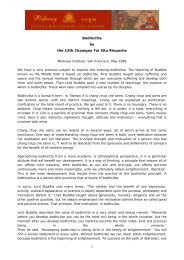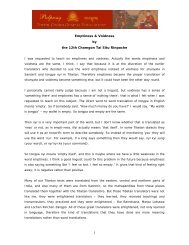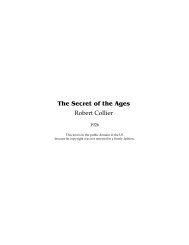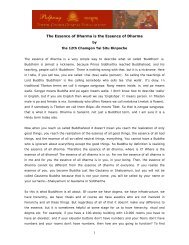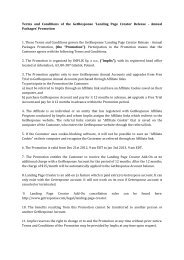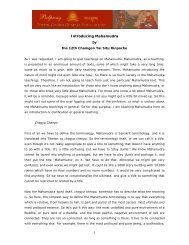Student: Oh, backwards! In o<strong>the</strong>r words, it is like <strong>the</strong>ir history going back. I see.Rinpoche: “De-wa-sheg-pa” is <strong>the</strong> Tibetan term for Sugata, which are <strong>the</strong> Buddhas whohave gone beyond and reached <strong>the</strong> state <strong>of</strong> freedom from pain and suffering. <strong>The</strong>y are <strong>the</strong>ones who traversed <strong>the</strong> path <strong>of</strong> <strong>the</strong> bodhisattvas and established <strong>the</strong> bodhisattva mind.Student: So, <strong>the</strong>y are successful bodhisattvas.Question: Your Eminence, do you think that as lay-people <strong>the</strong>re is an obstacle for us indeveloping ultimate bodhichitta because we will always tend to want more <strong>of</strong> <strong>the</strong> fourimmeasurables for our children or loved ones. Or do you think, in fact, that it teaches usultimate bodhichitta?Rinpoche: Yes, it is not necessarily so. If one is following <strong>the</strong> life <strong>of</strong> renunciation by givingup a householder’s life and generates bodhichitta properly, <strong>the</strong>n this life would be easier andone would have more time and energy to put into <strong>the</strong> practice. <strong>The</strong>n <strong>the</strong> practice could bemore effective. This is why <strong>the</strong>re is <strong>the</strong> Vinaya, why <strong>the</strong> Buddha placed a great deal <strong>of</strong>emphasis on <strong>the</strong> sangha <strong>of</strong> <strong>the</strong> ordained. But <strong>the</strong> main thing is bodhichitta <strong>of</strong> <strong>the</strong> heart. Justbecause you are an ordained member <strong>of</strong> <strong>the</strong> sangha, it doesn’t mean you are generatinggreater bodhichitta. It depends upon <strong>the</strong> individual. Some people have problems being ahouseholder, o<strong>the</strong>rs don’t.Question: Your Eminence, in <strong>the</strong> Mahayana it seems that we welcome aggression, whichhelps us develop bodhichitta in our tonglen practice. Passion, <strong>the</strong> same way, helps us. But,what is <strong>the</strong> antidote for ignorance and how do we work with that in Mahayana?Rinpoche: <strong>The</strong> antidote for ignorance is prajna, what I discussed already. If you are reallygenerating bodhichitta it shows that you have wisdom. When faced with aggression,responding with bodhichitta is an example showing that this comes from prajna.Question: Your Eminence, you have used <strong>the</strong> expression <strong>of</strong> accumulating merit or virtueand I have seen it a lot <strong>of</strong> times in <strong>the</strong> chants. But I don’t really understand it and I don’t knowwhy I would accumulate merit, or what I would do with it.Rinpoche: <strong>The</strong> accumulation <strong>of</strong> merit doesn’t mean that you accumulate something youstack into a heap so that in <strong>the</strong> end you have difficulties finding enough room to store it. If thiswere <strong>the</strong> case we would have so many difficulties finding enough room to stack all <strong>the</strong>defilements. Ra<strong>the</strong>r, accumulation <strong>of</strong> merit habit, means, that one gives up habitual actionsdestructive to oneself and o<strong>the</strong>rs. Along with this one develops <strong>the</strong> mundane and spiritualhabits <strong>of</strong> truly benefiting oneself and o<strong>the</strong>rs. We speak about <strong>the</strong> two accumulations <strong>of</strong> meritand wisdom. <strong>The</strong> accumulation <strong>of</strong> merit is generosity that lacks highest wisdom. This lessensone’s harmful habits. However, at this point, one hasn’t transcended habit. <strong>The</strong> accumulation<strong>of</strong> wisdom is beneficial actions that are done with <strong>the</strong> experience <strong>of</strong> emptiness. Healthy andvirtuous habits are <strong>the</strong> accumulation <strong>of</strong> merit.18
All contents © Jamgon Kongtrul Labrang.For fur<strong>the</strong>r teachings visit:http://www.greatliberation.org/shopiiiiiiiv<strong>Buddhadharma</strong> is <strong>the</strong> Buddha’s teachings; dharma means “phenomena” or “mental objects” (cf. <strong>the</strong> tenetymological meanings <strong>of</strong> dharma in note 2).Interdependent origination (Tib. tendrel) has been translated as interdependence and dependentorigination. This is a very important concept since it explains how things happen without <strong>the</strong> existence <strong>of</strong>a god or creator. <strong>The</strong> Buddha explained simply that everything in <strong>the</strong> world is related to everything elseand when something happens it is due to <strong>the</strong> relationship between cause and effect. <strong>The</strong>re are actuallytwelve steps (called <strong>the</strong> Nidana chains): ignorance, mental formations, consciousness, name and form,<strong>the</strong> six sense fields, contact, feeling, craving, grasping, existence, birth, aging and death. Ignorance,craving and grasping are <strong>the</strong> afflictive mental states, mental formation and existence are karma, and <strong>the</strong>remaining seven are suffering. For a detailed explanation <strong>of</strong> this see Thrangu Rinpoche’s <strong>The</strong> TwelveLinks <strong>of</strong> Interdependent Origination, available from Zhyisil Chokyi Ghatsal Publications.<strong>The</strong> English term for this might be “transcendental compassion” meaning compassion not just for a fewpersons, but for all sentient beings. In <strong>the</strong> Sanskrit “bodhi” means “awakened” or “enlightened” and“citta” means “mind,” so bodhichitta means awakened mind. Many translators prefer “awakened” over“enlightened” because <strong>the</strong> word enlightened is a non-Buddhist term that was first used when Buddhismwas introduced. In Tibetan this “awakened mind” was translated as “chang chup kyi sem” in which“chang chup” means “awakened” and “kyi” is a conjunction and “sem” is mind. So <strong>the</strong> Tibetan translatorstranslated <strong>the</strong> Sanskrit quite literally into Tibetan<strong>The</strong> generation <strong>of</strong> bodhichitta is based on <strong>the</strong> altruistic wish to bring about <strong>the</strong> welfare, and ultimately<strong>the</strong> total liberation, <strong>of</strong> all sentient beings from all forms <strong>of</strong> suffering. What distinguishes bodhichitta from<strong>the</strong> ordinary compassionate aspirations to benefit o<strong>the</strong>rs shared by all people <strong>of</strong> good will is <strong>the</strong>recognition that one cannot ultimately fulfil <strong>the</strong>se aspirations until one has attained <strong>the</strong> state <strong>of</strong> mentalpurification and liberation <strong>of</strong> Buddhahood, which is <strong>the</strong> source <strong>of</strong> all positive qualities, including <strong>the</strong>omniscience that can see, individual by individual, <strong>the</strong> causes <strong>of</strong> suffering and <strong>the</strong> causes and path <strong>of</strong>liberation from suffering. This understanding gives rise at some point to <strong>the</strong> initial generation <strong>of</strong> <strong>the</strong>aspiration to attain <strong>the</strong> state <strong>of</strong> Buddhahood in order to liberate all sentient beings from suffering and toestablish <strong>the</strong>m all in states <strong>of</strong> happiness. This is called aspiration bodhichitta, which must be followed bywhat is called <strong>the</strong> bodhichitta <strong>of</strong> entering or application bodhichitta, which is <strong>the</strong> training in lovingkindness, compassion, <strong>the</strong> six paramitas or transcendent perfections, etc., which lead to <strong>the</strong> attainment<strong>of</strong> Buddhahood. Aspiration bodhichitta and application bodhichitta are both included in <strong>the</strong> term relativebodhichitta. Ultimate bodhichitta is direct insight into <strong>the</strong> ultimate nature. This state <strong>of</strong> primordialawareness is compassion and loving kindness and gives rise spontaneously and without preconception tocompassionate activity. – Lama Tashi NamgyalAll meditation can be divided into <strong>the</strong> two categories <strong>of</strong> tranquillity meditation (Shamatha) and insightmeditation (Vipashyana). Vipashyana in turn can be divided into <strong>the</strong> Vipashyana <strong>of</strong> <strong>the</strong> sutra traditionand <strong>the</strong> Vipashyana <strong>of</strong> <strong>the</strong> Mahamudra tradition. In <strong>the</strong> sutra tradition <strong>the</strong>re is analytical Vipashyana andplacement meditation. In <strong>the</strong> Mahamudra or tantric tradition, Vipashyana is based on <strong>the</strong> direct pointingout <strong>of</strong> <strong>the</strong> nature <strong>of</strong> mind and <strong>the</strong> nature <strong>of</strong> things by a fully qualified and experienced holder <strong>of</strong> <strong>the</strong>Mahamudra lineage.v <strong>The</strong> four extreme mental limitations are: believing things essentially exist, do not exist, both exist and donot exist, and nei<strong>the</strong>r exist nor do not exist. <strong>The</strong> eight mental constructs or complexities are mentalformulations that phenomena have such attributes as arising and ceasing, being singular or plural,coming and going, and being <strong>the</strong> same or being different.19


